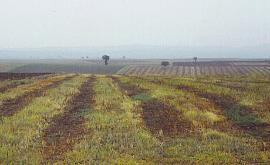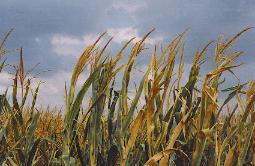| Crete's Culinary Sanctuaries |
email: info@cookingincrete.com
Copyright © 2004 Nikki Rose. All rights reserved
Copyright © 2004 Nikki Rose. All rights reserved


Gaia (Earth) and her husband Ouranos (Sky) were the first gods to rule the world. Fast-forward to Trigono, Greece, 1998 AD. A group of local women formed a cooperative "Gaia" to prepare and sell traditional culinary specialties unique to this area. Today, their membership has increased to 40 women and their services have expanded throughout the region. Isolated in the northernmost region of Thrace in the prefecture of Evros, Trigono or triangle is a small district between the Ardas and Evros rivers. Bulgaria is just over the Rodopi mountain range and Turkey is just across the River Evros. Scattered villages nestled between a colorful tapestry of family plots of sunflowers, corn, wheat and sugar beets alternate with industrial-size crops. Charcoal and gold striped wheat fields cling to the contours of the land, smoldering from post-harvest flames. At the Gaia production plant, formerly the old school house in the village of Kanadas, the members are juggling a whole host of projects and special orders. Outside in the organic garden, a production line of women are harvesting red peppers, eggplant and tomatoes and piling them into crates. Some vegetables are loaded into a van to be sent off to area restaurants while others are stacked up in the foyer for production. Inside, maneuvering in a maze of small rooms with limited workspace, one team is monitoring an industrial-size mixer filled with sweet red pepper dough, while another pair divides finished mounds into smaller rounds, which are then delivered to the production room to be divided into thumb-print pieces and lined up on massive racks to dry. Yesterday's production is in the modern dehydrator, hand crumbled to the size of stone-ground wheat. When completely dry, it's ready to be packaged. All this work is for the popular local staple, trahanas, a hearty pasta soup traditionally eaten at dawn before a long day in the fields. Just out of the ovens, giant sheet pans of briam, a heavenly medley of roast eggplant, potato, tomato and onion, will be delivered to a nearby village as part of the lunch menu for a group of immigrants who were discovered crossing the border from Turkey illegally – a tragic and frequent occurrence in this region. Everywhere, women are moving, moving -- carrying heavy crates and boxes with great ease and a little laughter -- strong, focused women. They're doing what they've always done, only on a much larger scale. The Gaia team produces several hand-made delicacies, ifkadia (broad egg noodles), ormatis (crumbled pasta, popular as children's cereal), cous- cous (a regional culinary link), as well as sweet liquors and preserves made from handpicked wild fruits and herbs. The demand for their preserves has outweighed the supply. "Annual stocks are as predictable as Mother Nature, and she's not responsible for quotas," said Gaia's manager, Krisoula Ioanidou. The Greek government considered the concept of Women's Agricultural Cooperatives in the 1980's, to address gender inequality in rural communities where employment opportunities, educational levels and equal rights are frightfully minimal. Most women in these areas born before the mid-20th Century participate in daily farming chores and maintain the household. This entails a whole host of duties, such as raising a large family, preserving foods for the long, fruitless winters and making clothing and textiles with little or no modern appliances. Despite the women's dual-roles, men usually control any financial benefits the family reaps. Olga Iakovidou, Professor on Rural Tourism and Rural Sociology at the Aristotle University of Thessaloniki said, "The ideological motivation for creating these cooperatives was the belief that they could help change women's status in rural areas...to guarantee women's economic independence as a first step towards their emancipation." Depending on the location, a range of services could be offered in agrotourism, ecotourism, local cuisine and trades. Training could be provided where necessary, and the preparation of foods or artwork could be a source of income as well as a way of preserving traditional trades. Several programs have been set up by national, EU and non-governmental organizations (NGO's) in an effort to sustain rural populations, integrate inhabitants of newly designated ecological danger zones and phased-out farm subsidies. Without proper advertising through public sector channels, many people are unaware of the existence of these programs. According to Dr. Georgia Valaoras, former director of WWF-Greece who now monitors LIFE environment projects for the EU, even though these new opportunities existed, women met resistance, not only from their families but also local authorities who were responsible for approving program proposals and delving out national and EU funds. She said "Rural traditions die hard...it was a big adjustment to allow women to work outside the home or farm." Today, most everyone realizes the benefits of the programs -- women making a different type of bread. By the mid-1980's, several cooperatives were up and running as part of a bigger picture in alternative tourism projects. Two model cooperatives were launched at WWF-Greece ecotouristic sites, Prespa and the Dadia Forest Reserve in central Evros, about 100 kilometers south of Trigono. Dr. Valaoras said the success of these cooperatives led to dozens more throughout Greece and they are "spreading like wildfire." Women of all age groups have become involved and younger women are seeking advanced education in site- related fields such as environmental studies and hospitality, effectively curbing the rural exodus as well as gaining financial and social equality. Collaboration with interrelated networks helped to spread the word. The advantage for most cooperatives is tourism. Due to the lack of tourism in northern Evros, Gaia's angle must be unique. Gaia's manager said, "It is a great disadvantage that we live and work so far away from the major markets." Cooperatives operate much like any business, someone's got to put up the capital to start the operation then prove to prospective investors that it's viable. The members pay dues and offer specialized services in anticipation of future returns and are ultimately responsible for the company's success. Dr. Iakovidou said, "Most of the women's cooperatives were established thanks to the funds of national or EU programs because membership dues are very low. Of course, there are some exceptions." The level of support greatly depends on the project. Proposals may cover agricultural, environmental and developmental issues, which requires the involvement of several ministries and NGO's. Thousands of applications for funding cross the EU desks each year. If and when a project is approved, it's then a matter of waiting for Euros to travel from Brussels to Evros. NGO's with related programs in the area, like WWF, often carry the interim weight and seek collaboration with private funders and local volunteers to keep the projects afloat. It took ten years to establish Gaia, after planning, concept design, paperwork, stamina and plenty of risks. The founding members are a diverse group of women: local politicians, teachers, farmers, and taverna staff. Ms. Ioanidou said, "Gaia was founded in order to give its members who wanted to work the opportunity to gain a supplementary income. Women can escape from their daily routine, be together at work and offer a small economic contribution to their households." They are expanding carefully and hope occupy a larger building with more equipment and land for their organic garden. Just this year, Gaia opened a lovely restaurant and retail shop at the old customs house at the Ormenio-Bulgarian border, acquired through the Greek Tourism Office. They have big plans, and they've already accomplished quite a bit, despite the obstacles they have faced. "The municipality of Trigono gave us little support, but other institutions in Evros were of great help...authorities in the central provinces of Orestiada and Didymoteicho," Ioanidou said. Gaia is now partially funded by the European Union's Leader II initiative, supporting businesses in disadvantaged rural areas. Athanasios Christidis, an official of the European Commission, said "Evros is a fragile region as a border area but also for environmental reasons which impose some restrictions to certain types of economic activity. Border regions are often isolated and less secure, especially a region like Evros as an external EU border. This is an element of social and economic fragility. Thrace as a whole is below the national GDP index and far below 75% of the EU GDP average. This is why I think that Thrace (and Evros subsequently) is in need of such programmes." Due to their geographic location, the people of Evros have been vulnerable to a swinging pendulum of political and environmental influences. During the 20th Century, the population swelled over its banks then trickled down to a stream. In the 1920's, Evros underwent rapid development to support Greek refugees forced from Asia Minor. Border shifts uprooted thousands more. Deforestation and diversion of the rivers created wide-open plains and opportunities for industrial farming; the future consequences of which were not a priority at the time. Stockbreeding was given up for cotton, corn and sugar beet crops. Nomadic shepherds stopped in their tracks as new boundaries were drawn. Traditional farmers had to adapt, invest and train for the industrial age. By the 1980's, many families gave up when fixed prices did not reflect skyrocketing operating or living costs. One retired farmer said "we kept adapting, investing in a future controlled by people who had never set foot on our land. Big crops require big money. Yes, we're all farmers, but how does a shepherd suddenly become an expert on cotton? No one wanted to leave but many people had no choice." Today, environmentalists warn that the region is in danger of becoming a wasteland due to unsustainable development and farming practices. Evros is also an ornithological sanctuary and main route for migrating birds, several of which are on the endangered species list. Dozens of conservation programs to protect the natural habitat are ongoing. Large areas have been deemed officially off limits for logging, hunting, fishing and farming. It's an ecological hot zone. Man versus fish, flora and fauna. What to sustain first? A great majority of Trigono natives moved to metropolitan areas or Germany decades ago for better jobs and educational opportunities. Only a few have returned to semi-retire or utilize the skills they acquired for other trades. With the population of the area at one- quarter of its original size, services have been cut or discontinued in many villages: Schools, libraries [see Alpha TV channel recent book donation], banks, post offices, pharmacies, clinics, public transportation, and even kiosks with daily news, were consolidated in a few select villages, creating isolation and massive loss of jobs. It's no wonder that the Gaia cooperative members are tireless in their mission. Gaia has brought new hope and empowerment to the women, many of whom see the financial rewards in the form of supplemental education for their children, which is crucial for their future. Above all, Gaia has received wide recognition for their special products, from participating in expositions and their presence in regional retail shops. A metropolitan supermarket chain expressed interest in carrying their delicacies. Good news or bad, since they don't yet have the capability to produce the quantities requested. They plan to take it slow and focus on quality. A small museum in the entryway of Gaia's new restaurant displays highlights of Evros: Dadia Protected Forest, the Evros Delta, Samothraki island and other points of interest. These are all significant ecological areas requiring long-term protection or restoration measures. A spacious, yet cozy dining room with high wood-beamed ceilings and rows of windows decorated with handmade lace curtains soften the sunlight. The atmosphere and the cuisine reflect the style of Gaia -- rustic refinement. |


